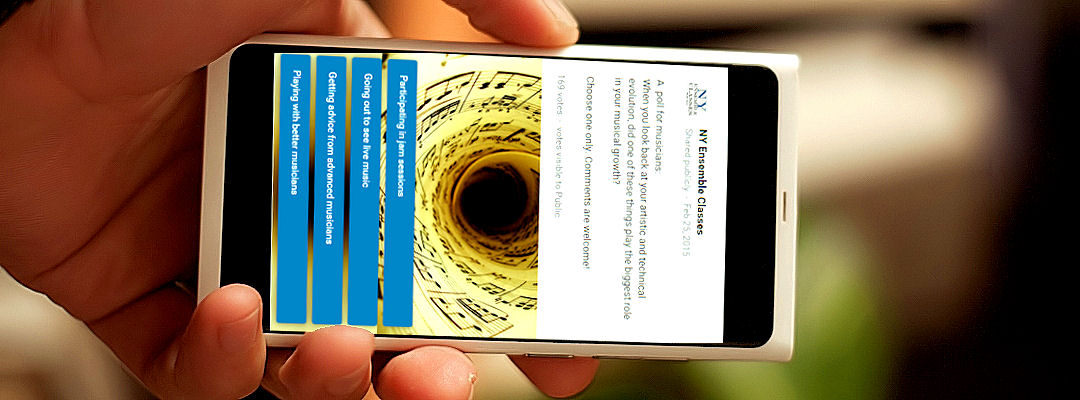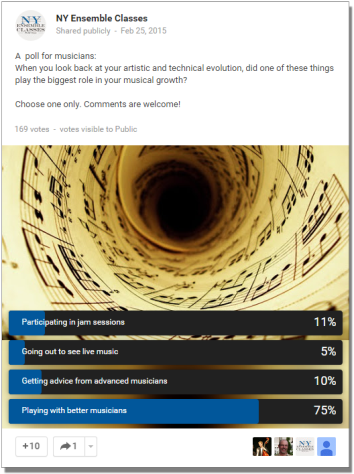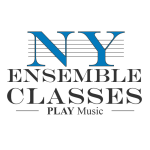
Back in February we posted a poll on social media, asking musicians from all over the world to indicate what played the strongest role in their musical growth. The four options were:
- Participating in jam sessions
- Going to see live music
- Getting advice from advanced musicians
- Playing with better musicians
The poll was not meant to be all-inclusive. We could not take into account everything that plays a role in a musician’s growth, so we decided to limit the options to things that are outside the realm of practice and regular education. We take it for granted that musicians need to study and practice their instrument. What really interested us was seeing what would come from asking this question to a wide demographic. Perspectives change depending on one’s history: there are self-taught musicians, those who have only studied privately and those who have pursued formal education. Different cultures probably play different roles in their musicians’ development too. We thought this would be an opportunity to gain some wisdom.
 Six months after posting the poll, we decided that it was time to gather the data and draw some conclusions. The option we expected to dominate did; what we didn’t anticipate was the magnitude with which it did: “Playing with better musicians” takes an astounding 75% of votes, followed by “attending jam sessions” and “getting advice from advanced musicians” with 10% and 11% respectively. Last in the poll comes “going to see live music,” with only 5% of votes. Google’s math is a bit shaky, but you get the idea.
Six months after posting the poll, we decided that it was time to gather the data and draw some conclusions. The option we expected to dominate did; what we didn’t anticipate was the magnitude with which it did: “Playing with better musicians” takes an astounding 75% of votes, followed by “attending jam sessions” and “getting advice from advanced musicians” with 10% and 11% respectively. Last in the poll comes “going to see live music,” with only 5% of votes. Google’s math is a bit shaky, but you get the idea.
Clearly most musicians believe to have made their greatest strides thanks to the experience of playing with better musicians. We can see why. It’s not just about “stealing with your eyes”: performing with someone who is more advanced forces you to push your limits, to rely on your strengths and to face your limitations. It gives you the unique opportunity to see and learn from how such musicians react to the music… and to you. It is a chance to observe how they make music while you are part of it. Sometimes better musicians advise you to play differently, sharing their experience and musical insight with you. And if you rise to the occasion it brings a lot of validation too.
In other words, playing with better musicians makes it easier to see what it is that you need to work on, which is crucial for a musician’s advancement.
Truth be told, we believe that all the options described in the poll are important for a musician’s development. The biggest surprise for us was to see that “going to see live music” got the least votes, a totally unexpected twist. Read artists’ biographies and you will often find a part where they mention how much seeing someone else performing live opened their eyes to something new!
On the bright side, “playing with better musicians” leads the poll, and we are delighted. Why? Because we believe that to be very important indeed, so much that our entire pedagogical system is based on this idea, in the form of two core principles: instructors should be involved with the ensembles (as bandleaders and performers) and students should meet different instructors in order to learn from the experience and philosophies of a variety of musicians. We trust these principles so much that we arranged our classes to be taught by two instructors at a time, placing more weight on the interaction and exchange between students and instructors.
Contentment aside, our primary goal was to analyze the results in the poll and gain some insight. Taking for granted that a true case study would require far more data and examination, we still want to reflect on it and come up with our own reading.
We’ll take the historical perspective.
Jazz was always learned by observing established musicians, participating in jam sessions, performing with more skilled musicians and generally being part of the community. According to what older musicians say, jam sessions have changed over time. They are still important for meeting peers but it seems that today the communal value of sharing “the craft” has somewhat faded, perhaps because jazz has become an academic field and most of the exchange is held within the walls of colleges and universities. Or maybe because of what Pat Metheny says in this brief interview:
The way we hear new music has changed radically too. Forget the luxury we have today with our thousands of tracks at our fingertips; older musicians remember how special it was back in the day when a new record came out. One would buy the latest LP released by a jazz master, and his fellow musician friends would show up at his house to chat about it together as they eagerly listened to track after track. Those musicians maintain that the way they learned music back then was more social than it is today. There were fewer books, fewer instructors, and information was harder to find, so it was natural for the musicians of those times to join forces and share what they had found. Every way to learn something new was special. Maybe if we asked the same question back then the votes would have been distributed more evenly across the options.
Today finding information is easy. One can browse the internet and learn a lot about technique, music styles, new or old artists and whatnot. Yet, the way musicianship is pursued has not changed much: music is human and its spirit is passed from person to person through human interaction. That’s especially true with music like jazz, which is so strongly based on interplay. Things have changed, but change is not bad or good per se. Technique requires hard work to be conquered, and the fact that knowledge is available to more people doesn’t make it easier to master or any less important. Chances are that as contemporary musicians we just take this wealth of information for granted.
However you feel about the subject, it is a relief to see that the real spirit of the music – as this poll confirms – has not changed. Maybe there is a reason why the one thing that people don’t have at their finger tips is the one that gathered the vast majority of votes in this poll. It may be true that we can Google everything about anything, but it looks like to make the next step, and truly move forward as musicians, we still need a community and the opportunity to play and share the music with other musicians, to learn from each other, and – when we are lucky – to share the bandstand with musicians who can show us what it looks like from where they stand, musically.
That’s because music is not a mere collection of notions. Music is a collection of sounds. And as those sounds travel through us, we discover new things about ourselves. Those who are ahead in the exploration cast their lights further out, and – if you are close enough – you may get to see what they see.
_________
NY Ensemble Classes is a music school located in New York City, in the heart of Manhattan. We teach jazz workshops in a very special way, like no one else in the city, read more!





